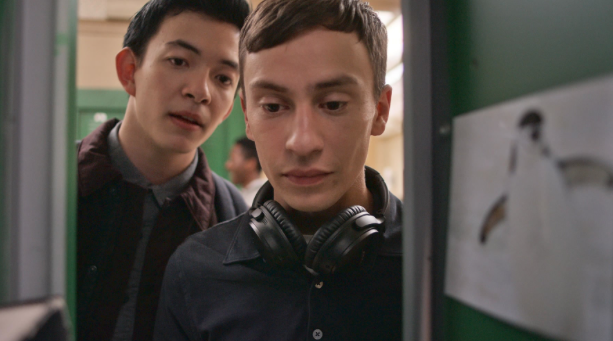by Ben Miller

When Atypical debuted last year, it was not accompanied by widespread critical acclaim or a zeitgeist-catching wave of popularity. It was seen as more of a niche show with some issues, but with room to grow and a modest budget. Season two didn’t have built-in expectations that a show like Stranger Things or the final season of House of Cards will have. This proves a blessing: with zero expectations, Atypical has now grown into the show we hoped it could be...
The overarching theme of season two is to move forward without leaving anything behind. In that vein, the premier sets the table of autistic high schooler Sam (Keir Gilchrist) navigating his romantic life while his family fractures in the background. Sam’s mom Elsa (Jennifer Jason Leigh, getting better after a rough season one) cheated on his dad Doug (a warm Michael Rapaport) after being discovered by his younger sister Casey (Brigette Lundy-Paine).
Season one suffered from a fracture perspective, focusing far too much on Elsa and Sam’s therapist Julia (Amy Okuda), compared to the way Sam’s actions and life affects those around him. Season two shifts the focus to the fissure in the Elsa-Doug marriage, Casey’s move to a private school and Sam’s upcoming transition to college.
 Keir Gilchrist and Brigette Lundy-Payne as siblings
Keir Gilchrist and Brigette Lundy-Payne as siblings
This renewed focus also narrows the storylines to bare bones and removes all the fluff that we otherwise don’t care about. Julia’s story is still around, but only alluded to here and there, and mostly played for laughs.
The new season also features the show’s first signature episode, where three separate storylines run in perfect parallels and have a serialized effect on the rest of the season’s momentum. It’s a classic TV trope, where sets of characters get their own adventure and never really interact. Sam spends his first night out of the house with his friend Zahid (scene-thief Nik Dodani), Elsa and Doug put their separation on hold to deal with the fallout from an altercation Sam had at school, while Casey is inadvertently involved in a love triangle.
Of course, being a show centered around autism, some PSA-level ideas need to be shoehorned in. Sam gets arrested in the same episode after being mistaken for a drug user, since the police don’t know how to handle people on the spectrum. This leads to a mini crusade for Elsa and Doug to teach first responders the ins and outs of autism. It’s the only part of the season that feels clunky, despite being a necessary step in the real world.
Lundy-Paine continues to be the MVP as she transitions to a new environment as well as an unexpected sexual awakening rears its head in the final few episodes. The humor has also been ramped up significantly, with an obvious attempt at a Community/Happy Endings-style rapid-fire joke system at times, even if they haven’t nailed the execution just yet. They even brought in the overqualified Casey Wilson as a school counselor, but don’t give her enough to do or say.
Despite the increase in humor there are still some explosive emotions. In the finale, Sam’s mom gives him a list of expectations she had for her son when he was five. When he reads them aloud before his high school graduation, my poor wife took 45 minutes to recover!
 Mirroring the overall 'moving forward' theme of the season, the overall quality of the show is improving. While I would have given season one a commendable B-, I would rate this season a B+ or an A-. Season one threw out lots of ideas to see what stuck. Season two builds on one idea and reacts naturally to the ripples.
Mirroring the overall 'moving forward' theme of the season, the overall quality of the show is improving. While I would have given season one a commendable B-, I would rate this season a B+ or an A-. Season one threw out lots of ideas to see what stuck. Season two builds on one idea and reacts naturally to the ripples.
For example, Sam decides he wants to leave home for college, so he begins to attempt pieces of independence, a little at a time. First, he gets his own bank account (there’s a wonderful joke about how banks have no smell), then he gives living outside the house a trial run, followed by complete and total independence (despite still living at home). There are no bizarre right turns or illogical character decisions; everything feels like it should.
This is what I look for in a new show. Learn from mistakes, continue to do what you did well, and move forward. Sam is doing it, and so is the show. The biggest problem with season three will be those renewed expectations that follow a fine season.
Atypical season two is now available for streaming on Netflix.